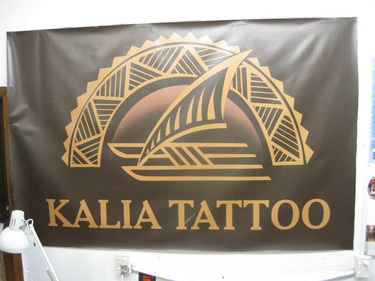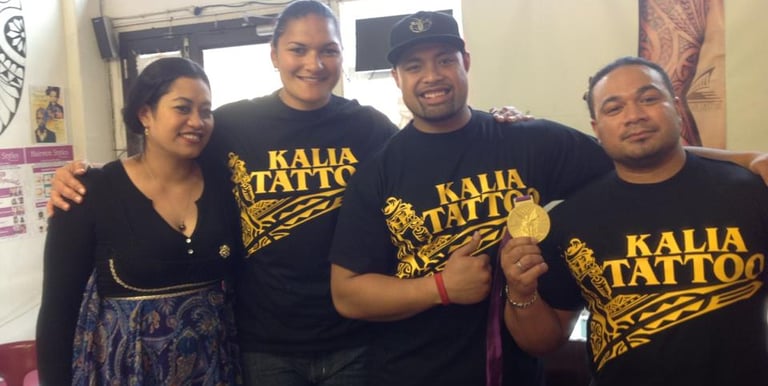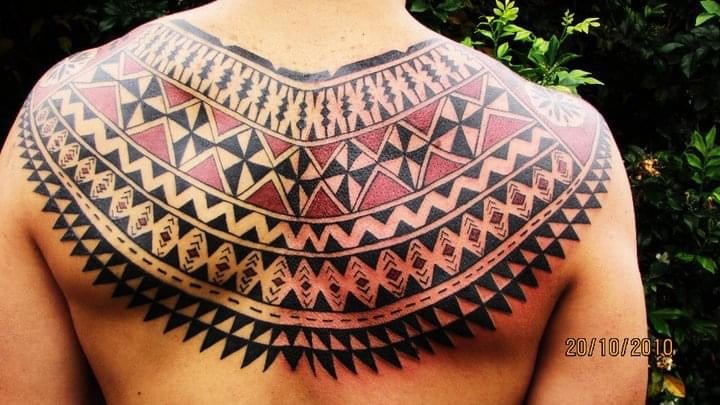
Contact Us: Quelle est la signification des tatouages polynésiens ?
Give us some details about your project and our shop team will contact you shortly to talk through your idea.
Location Info
Kalia Tattoo is a private studio for Polynesian tattoo artistry in Brisbane, Queensland, Australia.
Appointments are by booking only, and the exact address will be provided upon receipt of your deposit.
Monday - Friday 09:00AM - 06:00PM
Saturday - Sunday 10:00am - 7:00PM
Mālō e lelei — the price of a tattoo: depends on several important factors. Every person’s body is different- different arm sizes, different skin tones, and different healing reactions. Tattooing is not a “one price fits all” product. It’s a custom fine art service — hand-crafted for your body, your story, and your cultural identity.
When Kalia Tattoo Ltd create a tattoo, it’s not like buying a can of tuna or a case of beer. It’s more like commissioning a painting or customizing a high-end car. You’re investing in lifetime art collection you will wear for life — art that will travel with you everywhere, long after material things fade.
The price also varies by region — tattoos in Brisbane are not priced the same as tattoo in Sydney, Perth, or Melbourne, because the cost of living, studio rent, tattoo supplies electricity, products, and insurance are all different. Just as real estate or cars have different prices depending on the city, tattooing has similar regional realities.
So before we talk numbers, I always ask:
💭 How much are you willing to invest in a lifetime art collection that you’ll never lose?
Every design is a one-of-one — custom-drawn and never repeated. It’s not only about ink; it’s about heritage, craftsmanship, and time.
If you’re serious about getting a piece like this, Message, Dms or visit www.kaliatattoo.com and we can discuss your story, your body size, and your budget — then we can give you a personalized quote.
TATTOO COST IN AUSTRALIA https://www.airtasker.com/au/costs/tattoo-artist/tattoo-cost/
TATTOO PRICES IN SYDNEY https://www.tattoora.com.au/tattoo-cost-sydney/
https://www.monarchtatstudio.com.au/blog/how-much-does-a-tattoo-usually-cost
TATTOO PRICES IN BRISBANE https://frngtattoo.au/brisbane-tattoo/
https://www.instagram.com/p/DJbkZvzxurQ/
TATTOO PRICE IN GOLD COAST
✈️ Carl Cocker Travel Tattoo Policy – Sydney & Other Cities
Carl Cocker of Kalia Tattoo is proud to serve clients across Australia—including Sydney, Gold Coast, Melbourne, and Perth—for cultural tattoo projects rooted in Polynesian Culture, Fijian, Maori, and Pacific Island Art Oceanic tribal heritage. However, all travel tattoo sessions require serious planning, commitment, and logistical support.To ensure a seamless, private, and culturally respectful experience, travel-based tattoo sessions include additional expenses on top of Carl Cocker’s creative tattoo commission.
✈️ Carl Cocker Travel Tattoo 📍 Breakdown of Travel Tattoo Costs (Sydney Example)
If you are requesting Carl to travel from Brisbane to Sydney for your tattoo project, here’s what’s included in your quote:
Category Estimated Cost (AUD) ✈️ Roundtrip Airfare (Brisbane–Sydney) $300+ – $500+
🧳 Luggage Check-In (Qantas Airlines – 2 Bags) $80 – $120
🚖 Ground Transport (Airport to Location) $40 – $100
🏨 Accommodation (7 nights – 14 nights) $1500 – $2400+
🥗 Daily Meals & Rest Days $30 – $80
💼 Travel Setup & Booking Fees Built into quote
💉 Tattoo Session (Half- Day Rate / Full-Day Rate) CONTACT Form on CONTACT page for Quote
📝 Total estimate for Sydney travel tattoos ranges, depending on the complexity, client, duration, and requested dates. Creative Direction & Cultural Design Included in quote
🎯 What This Covers:
Half-Day to Full-day custom tattoo session(s)
Exclusive Pacific Island Art, Polynesian Tattoos, or other cultural custom design tailored to your body and life story
All travel logistics (flights, setup, studio equipment, rest day planning)
Private and hygienic tattoo environment (at your home, hotel, or rented studio)
One-on-one consultation before and during your appointment
🔁 Other Travel Cities
Carl Cocker can also travels upon request to:
Melbourne
Perth
Gold Coast (if outside Brisbane)
Other regional cities (upon approval)
Travel quotes will reflect similar costs based on airfare, lodging, and logistical arrangements.
Multiple tattoo sessions - tattoo projects may require Carl Cocker to stay 2–4 days, and clients may be asked to assist in:
Booking clean, private space (Airbnb or Hotel )
Private Client tattoo location no cost
Tattoo studio will cost booth rental fee 15% - 35%
Providing rest day accommodations between long sessions
⚠️ Important Booking Notes
A non-refundable deposit is required to confirm all travel bookings.
Quotes are only provided after your booking form is submitted with exact location, tattoo size, placement, and photos.
Do not book unless you're 100% committed. Flights, time, and space are limited.
All designs are created on the appointment day, not pre-designed or mass-produced.
🌍 Why Carl Cocker Kalia Tattoo's Are a Lifetime Investment
Carl Cocker is not just a tattooist. He is a creative art director—with over 20 years of experience in Pacific Island Art, reviving, protecting, and honoring Polynesian Tattoos. His tattoo work is:
Custom-fitted to your body
Backed by ancestral storylines
A lifetime collection of Pacific Island heritage
You’re not just booking a tattoo—you’re commissioning a piece of cultural art history.
✅ Next Steps
Visit: www.kaliatattoo.com
Submit your Booking Form
Include: Tattoo placement, size, photo references, total tattoo budget and preferred travel dates
Kalia Tattoo team will contact you for a consultation and quote
🔗 Questions?
Serious inquiries only.
Kalia Tattoo Studio – Guest & Infection Control Policy
Purpose & Compliance with Health Regulations
Kalia Tattoo is committed to the highest standards of hygiene and safety. Our policies ensure compliance with Queensland Health regulations for infection control in personal appearance services. In Queensland, tattooing is classified as a higher-risk personal appearance service involving skin penetration and exposure to blood. Our lead artist, Carl Cocker, is certified in infection prevention for skin penetration treatments (Queensland Health HLTINF005 competency) as required by law. We strictly adhere to the Public Health (Infection Control for Personal Appearance Services) Act 2003 and the associated Infection Control Guidelines for Personal Appearance Services 2024, which mandate taking all reasonable precautions to minimize infection risks. This studio holds all necessary licences and certifications to operate, and we enforce the following policy to protect our clients, staff, and visitors.
Solo Appointment Requirement
For health and safety reasons, clients are expected to come to their tattoo appointments alone. We do not allow additional guests in the tattoo studio except under special circumstances. Key rules include:
No Uninvited Guests: Only the individual getting the tattoo is allowed in the procedure area. The studio is a controlled workspace – not a social club or hangout venue – so friends and family should remain off-site during the appointment.
No Children: We are a tattoo studio, not a daycare. Children (minors) are not permitted in the studio at any time, for their safety and to maintain a sterile environment. Tattoo studios contain sharp instruments and biological hazards inappropriate for kids.
No Pregnant Individuals: For health precautions, pregnant women are not allowed in the studio (whether as clients or guests). Tattooing carries infection risks and involves substances that could be unsafe during pregnancy. We appreciate your understanding in putting health first.
Exceptions – One Guest Limit: In rare cases where a support person is absolutely necessary (e.g. if a client requires physical assistance or translation), advance approval is required. Only one healthy adult guest may be permitted, and they must abide by all studio rules. The guest will be instructed to remain in a designated area, refrain from touching any surfaces or equipment, and wear protective gear if requested. Any approved guest who fails to follow hygiene protocols or becomes a distraction will be asked to leave immediately.
Rationale: Much like hospital visitation policies, our strict guest limits exist to ensure a clean, focused environment. When you visit a hospital or clinic, you cannot bring a crowd of visitors into an exam or operating room – similarly, our tattoo procedures demand undivided attention and a sanitary setting. Extra people in the studio increase the risk of contamination and distraction. This is a professional studio, not a social gathering place. These rules are in place to protect your health as the client, as well as the health of our artist.
Infection Control & Cross-Contamination Awareness
Tattooing is an invasive procedure that involves breaking the skin and working with blood. Both the client and the artist face exposure to blood-borne pathogens, bacteria, viruses, fungi, and other infectious agents if proper precautions are not maintained. Carl Cocker and Kalia Tattoo follow rigorous infection control practices in line with Queensland Health guidelines to prevent cross-contamination and disease transmission. It is vital that clients and any permitted guest also understand these risks and cooperate fully.
How Infections Spread: Infectious diseases can be transmitted in various ways within a tattoo studio environment:
Airborne or Droplet Transmission: Coughing, sneezing, or even talking can release respiratory particles into the air. Airborne diseases such as tuberculosis (TB), influenza, COVID-19, and the common cold spread via inhaling contaminated droplets. An infected person in the studio (client or guest) could put others at risk by expelling germs into the air.
The tattoo artist cannot afford to be exposed to such illnesses – for example, TB is a serious airborne infection that could incapacitate the artist and others. We therefore require that anyone who has a cough, fever, or other contagious respiratory symptoms not enter the studio. Masks or additional precautions may be requested at our discretion during periods of high respiratory illness circulation.
Contact & Surface Contamination: Germs also spread through direct contact or touching contaminated objects. In a tattoo session, we create a sterile field; however, when extra people come and go, they might unknowingly touch door knobs, countertops, chairs, the sink, bathroom fixtures, or other surfaces. Unwashed hands can transfer pathogens to these surfaces. If a friend touches the client’s freshly tattooed skin or shakes the client’s hand, they could introduce bacteria or viruses into the vulnerable tattoo site.
Even invisible traces of blood or fluids on surfaces can carry infection.
Skin-to-skin contact can spread certain infections as well. For example, a person with a cold sore (Herpes simplex virus) or a staph infection could pass it through casual contact. This is why unauthorized guests are not allowed to wander the studio or touch anything.
Blood and Body Fluid Exposure: The tattoo procedure itself involves blood contact, which is why we treat all blood and bodily fluids as potentially infectious.
Serious blood-borne diseases like HIV (Human Immunodeficiency Virus), Hepatitis B, and Hepatitis C can be transmitted through blood-to-blood contact. Our studio strictly follows sterilization, disinfection, and standard precautions (using gloves, disposable needles, sterilized equipment, etc.) to prevent any bloodborne transmission.
However, if an outsider in the room touches contaminated tools or wastes, or if the client themselves absentmindedly touches their bleeding tattoo and then a surface, it could spread pathogens. We minimize these risks by limiting access to the procedure area and enforcing proper hygiene.
Skin Infections and Conditions: Even when skin isn’t penetrated, skin diseases can spread in close quarters. Examples include bacterial infections like impetigo or other staph/MRSA infections, fungal infections such as ringworm (tinea), scabies (a skin parasite), or viral infections like cold sores. These can be passed via direct touch or contact with contaminated surfaces and linens.
Open wounds, rashes, or lesions on a client or guest can harbor bacteria/fungi that might infect a fresh tattoo. For this reason, we require that clients do not touch their fresh tattoo or the surrounding skin during the session, except as directed by the artist (e.g. when cleaning, and only with clean gloves or tissue).
Guests (if present by exception) absolutely must not touch the client’s tattooed area or any sterilized setup.
Examples of Diseases of Concern: (This list is not exhaustive, but highlights why we enforce strict hygiene)
Airborne/Respiratory Illnesses: Tuberculosis (TB), COVID-19, Influenza (flu), Common cold viruses, etc. – spread through the air via coughs or sneezes.
Blood-Borne Pathogens: HIV (AIDS virus), Hepatitis B, Hepatitis C, Tetanus, and other viruses or bacteria transmitted by blood and bodily fluids. Even a tiny drop of infected blood can carry these, so any blood contact must be treated with extreme caution.
Skin-Contact and Surface Infections: Impetigo (bacterial skin infection), Staphylococcus (Staph) infections including MRSA, Streptococcus infections, Fungal infections like ringworm/athlete’s foot, Scabies (microscopic mites), Cold sores (Herpes simplex), Chickenpox/Shingles (Varicella zoster), and even Head Lice – these can spread through touch or shared surfaces. Good hand hygiene and limiting surface contact are essential to prevent these.
Other Communicable Diseases: Any condition that is notifiable or highly contagious (for example, measles, chickenpox, whooping cough, COVID-19) should be disclosed to us before your appointment. We may reschedule clients who pose a health risk to others. Similarly, if you have any skin condition in the area to be tattooed (rash, sunburn, infection, eczema flare, etc.), inform us in advance – we may need to postpone until it heals to ensure your safety and a good tattoo outcome.
Studio Precautions: Kalia Tattoo maintains a clean and disinfected environment at all times. We follow all requirements of Queensland Health’s infection control guidelines: using hospital-grade disinfectants, single-use needles and gloves, proper sharps disposal, and cleaning of all surfaces before and after each client.
Our autoclaves and sterilization procedures meet medical standards. The artist will always wear new disposable gloves (changing them whenever they become contaminated), and all equipment that touches your skin is either single-use or properly sterilized. We keep logs of our sterilization cycles and strictly monitor spore tests for autoclave efficacy.
Do not be alarmed if you see Carl cleaning frequently or wearing a mask – this is all part of infection prevention. We also ask clients to wash or sanitize their hands upon entering the studio and before any breaks where they might touch their phone or face. By following these protocols, we create a safe tattooing experience for everyone.
Focus & Professionalism During Tattoo Sessions
Tattooing is a form of minor surgery on the skin combined with artistic creation. Concentration is critical. Unlike drawing on paper, a tattoo on skin is permanent – the artist cannot simply erase a mistake. Therefore, the studio environment must remain calm and free of distractions. Here’s how our policy supports focus and quality:
No Distractions: Extra people in the room talking, laughing, taking photos/videos, or moving about can break the client’s focus and the artist’s concentration. This increases the chance of an error or accident. We require a quiet, respectful atmosphere during the tattoo. Cell phones should be silenced. If you (the client) want to listen to music or need a break, inform the artist – do not attempt to multitask or entertain friends.
Client Cooperation: Clients must remain as still as possible and follow the artist’s instructions at all times. If you keep adjusting to talk to a friend or if someone is distracting you, it could lead to a sudden movement at the wrong time. By coming alone (or with at most one silent support person if approved), you help ensure the tattoo comes out perfectly.
Artist’s Right to Pause/Stop: The tattoo artist may pause or stop the session if at any point the environment becomes unsuitable – for instance, if an unauthorized person enters, if a guest’s behavior is disruptive, or if any contamination risk is observed. The artist will not continue until the issue is resolved (e.g. guest leaves, surfaces are re-sanitized). In extreme cases, the appointment may be terminated to protect health and quality.
Liability & Aftercare Responsibilities
By adhering to this policy, we greatly reduce the likelihood of infection or complications. Clients will be provided aftercare instructions at the end of their session, which must be followed diligently to ensure proper healing. Remember, the aftercare and environment outside the studio are beyond our control – if a tattoo becomes infected days later, it is often due to improper care or exposure after you left our studio. For example, allowing unclean hands to touch your fresh tattoo, or visiting a crowded bar immediately after getting inked, can introduce bacteria that cause infection.
We emphasize that having extra people around during or right after the procedure can compromise the sterility of the tattoo – this is why we enforce the rules above.
Kalia Tattoo is not liable for infections or issues that arise from client negligence or violation of our policies. If a client disregards safety instructions (such as touching the tattoo with dirty hands, exposing it to unsanitary conditions, or bringing in unauthorized guests who compromise the sterile field), any resulting complications will be deemed the responsibility of the client. We document our hygiene measures for each session, and our infection control certification attests to our professionalism.
Our goal is zero infections and 100% satisfied clients with beautiful, well-healed tattoos.
Agreement & Enforcement
Your booking with Kalia Tattoo signifies agreement to comply with this Studio Policy. We appreciate your cooperation in keeping our studio safe and professional. If a client or their guest fails to follow these rules, we reserve the right to refuse service, halt the procedure, or ask the person to leave the premises. These measures are not taken lightly – they exist to protect everyone’s health and to uphold the law and health guidelines.
Thank you for understanding that these policies are in place for your safety and ours. By coming solo to your appointment and respecting our infection control procedures, you are helping us create the best possible tattoo experience with the lowest possible risk. We are committed to delivering not only exceptional art, but also peace of mind that you are in a clean and secure environment.
Kalia Tattoo values your trust and will continue to maintain the strictest health standards as required by Queensland Health and our own internal protocols.
೨ References & Regulatory Sources: Queensland Health Infection Control Guidelines for Personal Appearance Services 2024; Public Health (Infection Control for Personal Appearance Services) Act 2003 and Regulation 2016; Queensland Health licensing and competency requirements.
Contact
kaliatattoo25@gmail.com




